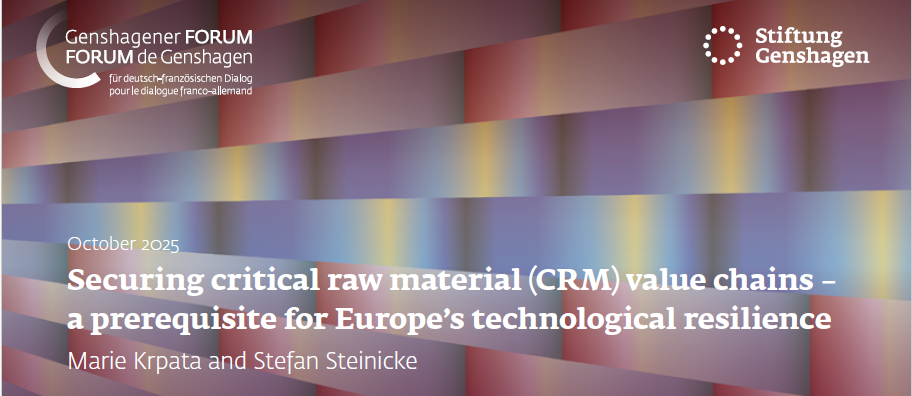Securing critical raw material (CRM) value chains – a prerequisite for Europe’s technological resilience

At the heart of economic security, technological resilience is a backbone of the European Union’s (EU) competitiveness. The EU’s energy and digital transitions depend on critical raw materials (CRM).

However, their supply is hampered by export restrictions challenging EU industries. CRM is a geopolitical issue, highlighting Sino-American technological rivalry. While China is pulling the strings, constraining exports of CRM, the US is doing so by limiting high-end technological products.
This paper resulted from a workshop at the 13th Genshagen Forum for Franco-German Dialogue (June 26 and 27, 2025) with the topic “EU competitiveness: heading or drift?”.
Marie Krpata, Research Fellow with the Study Committee on Franco-German Relations (Cerfa) at the French Institute for International Relations (Ifri)
Stefan Steinicke, Senior Manager Security and Raw Materials with the Federation of German Industries (BDI)
This publication is available on Genshagen Foundation: "Securing critical raw material (CRM) value chains – a prerequisite for Europe’s technological resilience".

Available in:
Themes and regions
DOI
Genshagen Forum for Franco-German Dialogue. Genshagen Foundation, Berlin
Share
Related centers and programs
Discover our other research centers and programsFind out more
Discover all our analysesMerz’ European Policy-making: The End of the ‘German Vote’?
Friedrich Merz’s European ambition is to turn Germany, long seen as hesitant into a leading actor within the European Union (EU). To that end, he has pledged to end the “German vote,” a phenomenon that epitomizes the paradox of a country both indispensable and frequently absent from European decision-making.

Reconciling competitiveness and demographic change: a Franco-German imperative
France and Germany are facing parallel demographic shifts that could reshape the future of their economies and their social models. These shifts reflect broader European patterns but are magnified by the central role both nations play in EU governance and competitiveness.
Taking the Pulse: Does France's Political Crisis Weaken Europe's Geopolitical Hand?
While the EU tries to navigate a myriad international challenges, France is experiencing historic political disarray. What impact will instability in Paris have on Europe's geostrategic capacity?
Imaginary and Reality of the Franco-German border: a Laboratory for Europe of tomorrow
In Europe, the question of borders is a central issue. According to the European Parliament, border regions cover around 40% of the European Union (EU) territory, concentrate 30% of its population and produce nearly a third of its gross domestic product.











